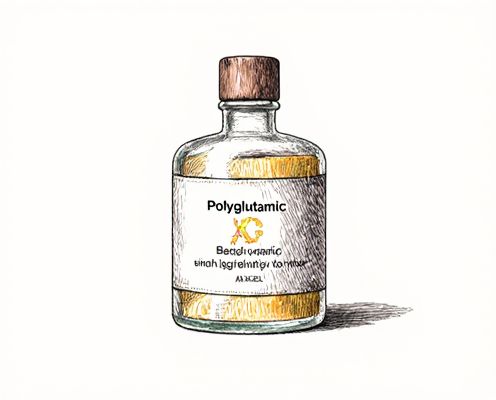
Polyglutamic acid Illustration
Polyglutamic acid is a powerful humectant that enhances skin hydration by locking in moisture and creating a smooth, plump complexion. Its superior water retention properties outperform traditional hyaluronic acid, making it ideal for dry or aging skin. Regular use supports skin elasticity and promotes a radiant, youthful appearance.
Introduction to Polyglutamic Acid: A Breakthrough in Skincare Hydration
Polyglutamic acid (PGA) is a powerful hydrating ingredient derived from fermented soybeans, offering superior moisture retention compared to hyaluronic acid. Its unique molecular structure enables it to hold up to 5000 times its weight in water, delivering intense and long-lasting hydration to the skin. PGA enhances skin elasticity and smoothness, making it a breakthrough component in advanced skincare formulations.
How Polyglutamic Acid Boosts Skin Moisture Retention
Polyglutamic acid enhances skin moisture retention by forming a thin, breathable film that locks in hydration and prevents water loss. Its high molecular weight allows it to attract and hold up to five times more moisture than hyaluronic acid, significantly improving skin elasticity and smoothness. This powerful humectant supports natural skin barrier function, resulting in long-lasting hydration and a plump, healthy complexion.
Polyglutamic Acid vs Hyaluronic Acid: Which is Better for Dry Skin?
Polyglutamic acid (PGA) holds up to 4,000 times its weight in water, surpassing hyaluronic acid's (HA) moisture retention capacity, making it exceptionally effective for dry skin hydration. Unlike HA, PGA forms a protective film on the skin that reduces water loss while enhancing skin elasticity and smoothness. For individuals with dry skin, incorporating PGA can offer longer-lasting moisture and improved skin barrier function compared to traditional HA-based products.
Key Benefits of Polyglutamic Acid for Women's Skin Health
Polyglutamic acid is a powerful humectant known for its exceptional ability to retain moisture, improving skin hydration and elasticity, which reduces the appearance of fine lines and wrinkles in women's skin. This biopolymer strengthens the skin barrier, promoting overall skin resilience and protecting against environmental stressors such as pollution and UV damage. Its lightweight texture enhances the absorption of active ingredients in skincare products, boosting the effectiveness of anti-aging and brightening treatments.
Top Polyglutamic Acid Skincare Products for Enhanced Hydration
Polyglutamic acid (PGA) is a powerful humectant known for its superior hydration capabilities, retaining moisture up to four times more effectively than hyaluronic acid. Top polyglutamic acid skincare products like Hada Labo's Gokujyun Alpha Cream and The Ordinary's Polyglutamic Acid 7% Serum deliver intense hydration, improve skin elasticity, and enhance overall radiance. Integrating these high-quality formulas into daily skincare routines helps maintain long-lasting moisture balance and combats dryness for a smoother, plumper complexion.
How to Layer Polyglutamic Acid with Other Beauty Ingredients
Polyglutamic acid (PGA) works best when layered after cleansing and toning, applying it before heavier creams or oils due to its hydrating and film-forming properties. Combine PGA with hyaluronic acid for enhanced moisture retention, ensuring PGA is applied first to create a smooth absorption base. Avoid using PGA with strong exfoliants or acids simultaneously to prevent irritation and maintain skin barrier balance.
Choosing the Right Polyglutamic Acid Serum for Your Skin Type
Selecting the right polyglutamic acid serum depends on your skin type, as this ingredient excels at delivering intense hydration and boosting moisture retention. For oily or acne-prone skin, lightweight, non-comedogenic formulations with polyglutamic acid prevent pore clogging while providing lasting hydration. Dry or sensitive skin benefits from richer serums combining polyglutamic acid with soothing ingredients like hyaluronic acid or ceramides to enhance skin barrier repair and minimize irritation.
Polyglutamic Acid in Anti-Aging: Reducing Fine Lines and Wrinkles
Polyglutamic acid is a powerful skincare ingredient known for its superior moisturizing properties, which help reduce fine lines and wrinkles by enhancing skin hydration and elasticity. Unlike traditional hyaluronic acid, polyglutamic acid retains moisture more effectively, promoting smoother, plumper skin and supporting collagen production. Incorporating polyglutamic acid into your anti-aging routine can visibly improve skin texture and diminish signs of aging.
Application Tips: Maximizing the Effects of Polyglutamic Acid
To maximize the effects of polyglutamic acid in skincare, apply it on damp skin to enhance hydration and improve absorption. Layer polyglutamic acid underneath moisturizers or serums with hyaluronic acid to boost skin plumpness and maintain long-lasting moisture. Regular use of products containing polyglutamic acid supports skin elasticity and reduces fine lines by locking in moisture more effectively than traditional humectants.
Frequently Asked Questions About Polyglutamic Acid in Beauty Routines
Polyglutamic acid (PGA) is a powerful hydrating ingredient known for its ability to hold up to 5000 times its weight in water, making it a superior moisturizer in skincare routines. It is often compared to hyaluronic acid but is preferred for its longer-lasting hydration and smoother texture that enhances skin elasticity and suppleness. Common questions include how to incorporate PGA into daily skincare, its compatibility with other active ingredients like retinol or vitamin C, and its suitability for sensitive skin types due to its gentle, non-irritating nature.
 womendy.com
womendy.com